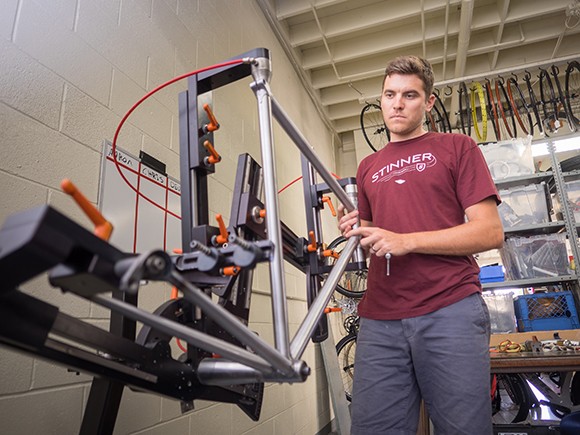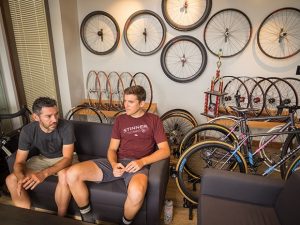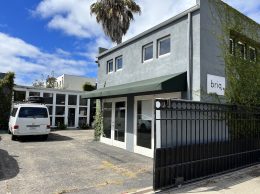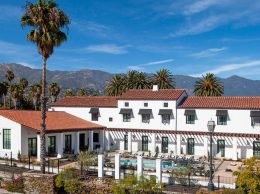Pedal to the metal: Stinner Frameworks expands
IN THIS ARTICLE
- Latest news Topic
- Elijah Brumback Author
By Elijah Brumback Friday, March 20th, 2015

Aaron Stinner works in his shop near the Santa Barbara Airport. His company, Stinner Frameworks, has a fast-growing presence in the world of hand-built bicycles. (Nik Blaskovich / Business Times photo)
Aaron Stinner ditched a path to medical school and started building bicycles in his garage about five years ago. Today, his company, Stinner Frameworks, is the biggest handmade bike builder from Santa Cruz to Mexico.
The company graduated from Stinner’s garage in November and moved to a new facility near the Santa Barbara Airport. Operations at the roughly 1,000-square-foot shared workshop just off Hollister Avenue are already squeezed with orders for new bikes on the rise.
“The whole handmade industry is bananas right now,” Stinner said. “But you get to a certain point and you have to start asking what do you let go, how do you grow, how do you keep the integrity of the company without selling out. To the outside world, that can be a fine line.”
Stinner said companies are either struggling and considered awesome or they’re making money and suddenly not cool anymore. To give customers what they want and turn bikes around quicker, the company needed to grow up and organize, he said.
The company currently churns out and ships a bike in about 12 weeks, but the goal is to get that time down to eight weeks in the next six months, then down to four to five weeks by the end of 2016. Seven weeks is considered best in class for the industry.
In 2010, Stinner was building bikes for a few friends. This year, the company is planning to finish about 150 to 200 custom bicycles.
That may not seem like a lot, but at a base price of about $4,000 for a complete setup, the company is focused on craftsmanship and tailoring each bike to the individual rider. When all is said and done, some bikes can run well beyond the $10,000 dollar mark.
The company is one of just 100 or so handmade bike builders in the U.S. that, save for components like brakes and wheels, custom manufacture everything from the bicycle frame to the paint.
For companies like Stinner, the most important part of building a bicycle isn’t about using the latest and greatest materials like carbon fiber. Instead, it’s all about fit, riding style and personal aesthetic preferences.
“It’s a lot of asking, ‘What are you riding now, what are your measurements?’ That makes up about 40 percent of the fit,” Stinner said. “The other 60 percent is, ‘what do you like about your bike, what kind of riding do you do?’ and really digging into the type of person.”
The company mostly targets seasoned riders considered part of the performance recreation market.
The hand-built bicycle industry somewhat mirrors the craft beer boom in that new companies are emerging every day and starting to slowly chip away at the market share of the major brands.

Stinner Cycles CEO and Director of Sportif Gary Douville, left, with founder and Chief Production Officer Aaron Stinner. (Nik Blaskovich / Business Times photo)
Still, the hand-built segment of the industry accounts for only about 3.3 percent of the overall U.S. bike industry, which is valued around $5.8 billion, according to 2013 data from the National Bicycle Dealers Association. Almost 99 percent of the bicycles sold in the U.S in 2013 were assembled in Asia.
On top of that, just four companies own about half of the 140 bicycle brands sold nationally, with Trek Bicycle Corp., Specialized Bicycle Components and Giant Bicycle holding the top three positions in the independent dealer market. Well known companies like Schwinn, Gary Fischer, Cannondale and others are under the wings of the top four.
Despite their size, Stinner Frameworks and other small builders like Boulder, Colorado-based Mosaic Cycles have an outsized influence in the market, due to the cult-appeal and quality of their brands.
In 2005, a Kentucky-based builder named Don Walker founded the North American Handmade Bicycle Show. Held annually in different locations around the country, the event has grown significantly and is essentially the epicenter for industry taste-making.
In 2005, there were 23 exhibitors and 700 attendees. The event has since grown to include more than 170 exhibitors and over 7,300 attendees.
It was at NAHBS in 2012 in Sacramento that Stinner Frameworks emerged as a builder to watch.
Aaron took home the Rookie of the Year award for his 29er mountain bike frame. The company recently returned from showcasing an expanded lineup of bikes at this year’s show.
Gary Douville recently signed on with Stinner as the company’s CEO and “directeur sportif.” Douville has worked for roughly 18 years in product development most recently as the general manager at the Santa Barbara division of Textron, an international aircraft, defense and industrial firm.
After a little over a year of talking back and forth, Stinner partnered with Douville to hammer out the business model. Stinner had previously managed Bicycle Bob’s in Santa Barbara, before cutting his teeth on hand building bikes at the United Bicycle Institute in Oregon. But he had never owned his own business.
“I had struggled with a few things, mostly just normal business and manufacturing problems like getting held up at paint or suppliers not working out,” Stinner said. “I was a one-man show, trying to do everything. … There was a moment when I was really struggling to figure out where to take the business and that’s when Gary and I started talking.”
Together they’ve brought the staff up to five streamlined operations, brought in some new investment, launched a new website and formed a plan to grow the company over the next two years.
“All of that happened extremely quickly,” Douville said. “It went from hypothetical — we could do this on paper — to where we are today almost happening overnight. We’re about three months ahead of where we thought we’d be in our business plan.”
The company’s website and features with industry trend watchers like the Radavist and CX Magazine helped build exposure. The company has shipped bikes and performance apparel kits around the world.
Stinner now hopes to dive into more research and development and to launch an updated version of its website that includes a point-and-click customization feature allowing customers to virtually build their bikes.
Figuring that out might take some time, but the result would be a gamechanger, Douville said.
“We’re starting to find a rhythm,” Stimmer said. “Now there is just more motivation to go out there and get more people on our bikes.”











